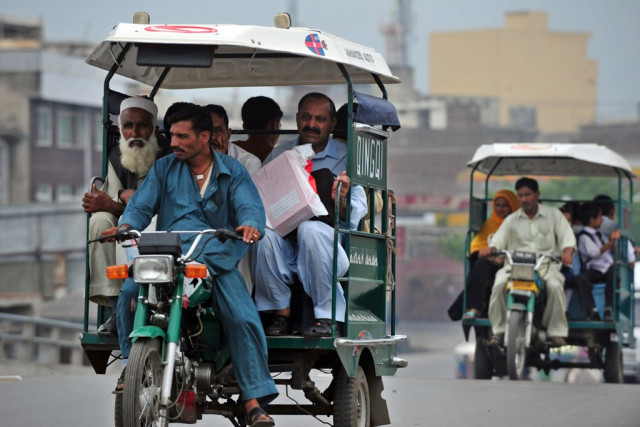Public transport: Survey on motorcycle rickshaws completed
The findings will be sent to a committee next week .

An LTC official privy to the matter told The Express Tribune that the LTC had decided not to suggest a ban on these rickshaws considering the economic activity linked to them. PHOTO: AFP
The survey, conducted over 39 days, was completed on February 28. Data collection camps had been set up at 11 locations in the city on January 20. Four mobile camps were added on February 15.
The survey had been commissioned to the Lahore Transport Company by the provincial government. They will send the survey’s findings and recommendations to a committee headed by MNA Mehr Ishtiaq next week.
An LTC official privy to the matter told The Express Tribune that the LTC had decided not to suggest a ban on these rickshaws considering the economic activity linked to them. He said on average, a Qing Qi carried four to five passengers at a time. He said the LTC would suggest that this mode of transport be made available in areas where other public transport was absent. These rickshaws could function on routes feeding those where other means of public transport was available. “We should benefit from the size and mobility of these rickshaws,” the official said.
He said the LTC would suggest the committee to demarcate the zones where Qing Qis could operate. One such zone could be the Walled City. He said it was hard to enforce safety regulation as most Qing Qi owners were not amenable to the idea. Instead, he said, the companies manufacturing the rickshaws would be issued the guidelines.
Lahore Transport Company Operations Manager Faisal Naseer said when the survey began the survey collectors would collect data on almost 3,000 Qing Qis a day. The number dwindled to a few dozen towards the end of the survey. He said they had continued the survey till they had managed to collect data on every survey plying the roads.
He said the survey collectors had stopped the rickshaws, ask their owners whether the rickshaws were factory manufactured of not, who owned the vehicles and an estimate of how many passengers they carried each day. Several questions were asked about the driver and a sticker was pasted on the Qing Qi.
He said the LTC would compile the data and the recommendations and send them to the committee for deliberations next week. “It would up to the committee to decide the fate of these vehicles,” he said.
One of the most interesting things the survey uncovered was a “limousine Qing Qi” made by a private vendor. It had nine seats, Naseer said. Such vehicles will be discouraged, however, he said. The authorities will be asked to keep an eye out for dangerous vehicle extensions, Qing Qis with two passenger seats should be allowed, he said.
Naseer said Qing Qis were not covered under the Motor Vehicles (Drivers) Ordinance 1942 and should be regulated as they create hindrance for traffic and economic loss to other public transporters.
Qaiser Ahmed, 18, a Qing Qi driver from Samsani said the LTC was trying to take them off the main roads. He said it was their sole source of income. When asked about frequent road accidents, he said some drivers drove recklessly knowing they wouldn’t be held responsible in case of an accident. But even motorcycles are dangerous, he said, yet they are legal. He said he had no problem with regulations as long as they were allowed to continue their business. He said he wasn’t sure about the total number of Qing Qis in the city, but they provided transport to hundreds of thousands of people each day. “The government should take this into account when deciding what to do about these rickshaws.”
Published in The Express Tribune, March 3rd, 2014.



















COMMENTS
Comments are moderated and generally will be posted if they are on-topic and not abusive.
For more information, please see our Comments FAQ